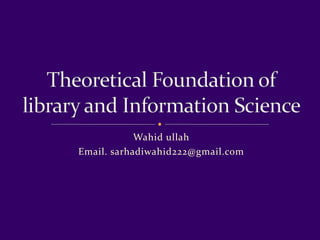
What is Epistemology? The Study of Knowledge
- 2. The term ‘Epistemology” comes from the Greek words “episteme” and “logos”. “Episteme” can be translated as “knowledge” or “understanding” or “Acquaintance”(knowledge or experience of something ). While ‘logos’ means as a account or argument or reason . It was introduced in english by a scotish philosopher names “James Fredrick Ferrier” (1808 -1864).
- 3. Deffinition : A branch of Philosophy that investigates the origion ,nature,method,and limite of human knowledge. Epistemology is the study or a theory of nature on grounds of knowledge especially with reference to it’s limit and validity. It is a branch of philosophy that deals with knowledge .
- 4. Episemology is the theory of knowledge ,especially with regards to its methods ,validity, and scope ,and the distinction between justified belief and opinion. Epistemology is the philosophy of knowledge . It seeks to answer the questions “what is knowledge” “how is knowledge acquired "and what do people know. Epitemologists are philosophers who are interested in questions such as whether it is possible to have knowledge , what kind of knowledge there is ,and how people come to know things .
- 5. What is knowledge ? Knowledge is justified as true belief . It means that : The person must be able to justify the claim . The claim itself must be true . The person must belief in it.
- 6. Knowledge as justified true belief : Let us assume that a person says “I know that people have walked on the moon” For this to be true knowledge. It must be possiable to justify that claim . It must also be a fact that people have indeed been to the moon . And finally the person must also actually believe that people have walked on the moon .
- 7. How is knowledge aquired ? There are different sources to record the truth . God (Allah )Religion (spiritual source) Qurain sunnah. Philosophers (critical thinking ) Knowledge can be earn by mingling with society by keen observation and questioning attitude and clearing the self opinion on each matter whether affect us or not by refering and filtering the various opinions of others.
- 8. What do people know? One of the major question we asked is : where does knowledge come from ? Many philosopher s have supposed that knowledge come from reason. Thus humans have the ability to reason and there for they have the power to know While other philosophers have contented that humans only become knowlgeable when they experience life situations such as watching a movie or playing an instrument .
- 9. These philosophers insist that man can only learn through his own senses . There is a theologically driven concept of knowledge which suggest that knowledge is a God given condition . This suggestion pertains to divine revelation and tends to blur the line between belief and knowledge since there are many religion .
- 10. There are some major branches of epistemology have developed over a period of time . Empiricism Rationalism Idealism Skipticism. Empiricism: In philosophy empiricism is a theory that states that knowledge comes only or primarily from sensory experience .
- 11. Empiricism emphasizes the role of empirical evidance in the formation of ideas ,rather than innate ideas or tradition .However empiricists may argue that traditions arise due to relations of previous sense experiences . Historically empiricism was associated with the “blank slate” concept according to which the human mind is blank at birth and develop s its thoughts only through experience.
- 12. Rationalism: In philosophy rationalism is the epistemological view that regards reason as the chief source and test of knowledge or any view appealing to reason as a source of knowledge or justification . More formally rationalism is defined as a methodology or a theory in which the criterion(judged or decided) of the truth is not sensory but intellectual and deductive.
- 13. Idealism : Idealism is the metaphysical view that associates reality to ideas in the mind rather than to material objects. It lays emphasis on the mental or spiritual components of experience, and renounces the notion of material existence. According to this approach an idea emerged and then tested physically will be the real knowledge.
- 14. Skipticism: It is generally a questioning attitude or doubts to words knowledge claims . Skeptic means one is in doubt . They are the philosophers who doubt the finality of knowledge . Knowledge is always have certain limitations. We can't take the 100% exact decision based on our knowledge.
- 15. Thank you